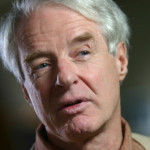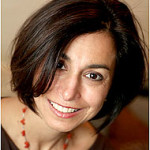I kicked off day three in the session on “Animating History,” featuring a panel including Adam Hochschild, Jane Kamensky, Isabel Wilkerson, and Scott Martelle.
I loved the idea from Isabella Wilkerson that an important part about figuring out who to focus on for a book (or story) is the process of “auditioning” subjects through interviews, trying to find the right characters that will help carry a strong story. The interviews with the people you wind up not focusing on isn’t wasted; you often learn a lot about the background of the topic that you can later use. It’s still great research that can help shape your work.

Adam Hochschild
Hochschild made a simple point that when choosing a subject for a big piece of historical writing, you need to “fall in love” with the topic. If you aren’t fascinated by it, passionate about it, it will be a lot harder to commit the long hours (maybe years) it will take to complete the work. “It has to obsess you,” Hochschild says.
Random side note: Hochschild is everything I’d like to be when I grow up… He writes, speaks, and teaches for a living. More fundamentally, he’s eloquent, graceful, passionate about his work…
From the world of exploring history through writing, I moved on to the session on modern-day writing for profit: “Freeing Your Inner Entrepreneur: Learning survival instincts in the freelance world” with Larry Habegger, Jennifer Kahn, Marci Alboher, moderated by Christine Larson.
The panel was very strong. All four speakers brought different perspectives to the business of freelance work. Kahn, a former astrophysicist, does long-form freelance science writing for major publications like Wired and New Yorker, often having months to work on each publication. Larson seems to have a more varied set of freelance clients, and does a lot of shorter pieces; her ideas focused more on the practical side of drumming up and sustaining business, as well as facing the cold, serious numbers involved in making a living as a freelancer. Habegger and Alboher were the entrepreneurs of the panel, each juggling multiple projects and ventures as freelancers. The panel showed that if you want to be a freelancer, there are a lot of different approaches.

Marci Alboher
Alboher’s idea of “slash careers” is an interesting concept, especially for someone like me, who does both freelance writing and design. One of my goals leaving the conference is to read her book, One Person/Multiple Careers. It’s refreshing to see someone embrace the idea that some of us aren’t crazy for feeling strange doing just one thing. Alboher also mentioned how invaluable having a small, regular “freelance group” was to her earlier in her career. She and some likeminded writers met weekly, swapping ideas, reading each others work, providing edits and suggestions. Seems like another great idea I want to run with after the conference.
Gwen Ifil was the closing keynote speaker for the conference. She seemed just as polished as she does on TV, but also showed more of a sense of humor than comes across on Washington Week in Review. One fun anecdote; She described how earlier in her career, she would typically be assigned to whichever candidate was doing the worst in the presidential primaries. If a candidate saw her at their event, they knew their campaign was in big trouble.
Following the official end of the conference, there were a series of “master classes.” I’d gotten into a session on writing profiles. The master class had a nice format: only about ten people, with one instructor, for a 90 minute session. Our instructor was Rose Moss. At first, I was a bit puzzled with her leading a session on profiles, since she seems to be primarily a fiction writer. Moss spoke slowly, but had some insightful things to say. When doing a profile, she advised, ask yourself “what does this person do that expresses who they are?” Following on that idea, she showed us a selection from a Tracy Kidder story in which Kidder walks along a cliff with his subject, who stops and says:
From here the amount of land the dam had drowned seemed vast. Still gazing, Farmer said, “To understand Russia, to understand Cuba, the Dominican Republic, Boston, identity politics, Sri Lanka, and Life Savers, you have to be on top of this hill.”
Moss suggested that when we write profiles, we try to find a similar spot for our subjects. As she put it, “Every person has something that crystallizes how they see the world, the lens they use to see the world.” The key to a great profile, she suggested, was finding that lens and writing about it.
![Reblog this post [with Zemanta]](https://i0.wp.com/img.zemanta.com/reblog_e.png)